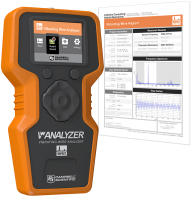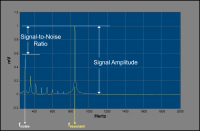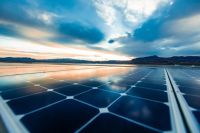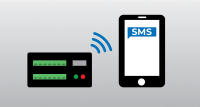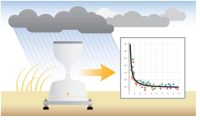The Campbell Scientific Blog Your source for useful how-to information and helpful expert advice
Displaying 21 - 40 of 152 articles
Why Is the CR6 the Preferred Automated Monitoring Platform for Geotechnical Applications Worldwide?
Author: Michael Adams | Last Updated: 01/08/2024 | Comments: 0
If you’re not using a CR6 Automated Monitoring Platform for your geotechnical application, you may be missing out on some key benefits that could help ensure the success of your instrumentation and monitoring network. Based on my 30 years of experience with data-acquisition systems, I’ll... read moreTips to Troubleshoot and Optimize Large RF Networks: Part 2
Author: Nathanael Wright | Last Updated: 12/20/2023 | Comments: 1
In this blog article, I’ll share with you the next five tips (6 through 10) that you can use to help troubleshoot your radio frequency (RF) networks. This is the second article in our three-part series. If you missed my first article or want to... read moreHow the DustVue Can Help You Get USABLE Soiling Data
Author: Ben Todt | Last Updated: 12/04/2023 | Comments: 0
Should you be concerned about the impact of soiling or fouling on your photovoltaic (PV) power plant performance? Did you know that in a recent estimate, more than US$6 billion of annual revenue is lost because of diminished power generation at PV facilities due to... read moreTips to Troubleshoot and Optimize Large RF Networks: Part 1
Author: Nathanael Wright | Last Updated: 10/31/2023 | Comments: 0
In this blog article, and the next two in the series, I’m going to share with you some tips you can use to help troubleshoot your radio frequency (RF) networks. In large RF networks, it can be challenging to achieve reliable spread-spectrum radio communications. (For our... read moreHow to Get Accurate Vibrating Wire Measurements with Long Cable Lengths
Author: Nathanael Wright | Last Updated: 10/17/2023 | Comments: 0
Typically, when you use long cable lengths for your vibrating wire measurements, you experience a weaker signal with a greater chance of interference. So, how do you overcome this challenge and improve your measurement quality? Keep reading to find out. At Campbell Scientific, our vibrating wire... read more5 Things a VWAnalyzer Can Do for You
Author: Jacqalyn Maughan | Last Updated: 08/29/2023 | Comments: 0
You may not realize just how helpful our handheld instrumentation can be—especially when it makes it easy for you to test your vibrating wire sensors, saving you time and money if a failed sensor is identified prior to installation. Let’s dive deeper into the five... read moreGet the Most out of VSPECT®
Author: Jacqalyn Maughan | Last Updated: 08/22/2023 | Comments: 3
Understanding the benefits of VSPECT® will help ensure you are maximizing your benefits when using this technology. In this article, we’ll explore this topic to provide you with a better measurement experience. Why do Campbell Scientific monitoring platforms give me extra vibrating wire data? Have you ever... read moreUse VSPECT® to Verify: Bad Sensors or Bad Data?
Author: Jacqalyn Maughan | Last Updated: 04/06/2023 | Comments: 0
Have you ever thought your bad vibrating wire sensor measurements were caused by erratic or erroneous data? You may be surprised to learn that data issues may not be the cause. If you are using a data-acquisition system other than one of the Campbell Scientific... read moreTroubleshooting Vibrating Wire Piezometers
Author: Nathanael Wright | Last Updated: 03/28/2023 | Comments: 0
Campbell Scientific vibrating wire measurement hardware, with our patented VSPECT® technology, offers a distinct advantage over all other vibrating wire measurement systems. Unlike non-Campbell Scientific vibrating wire interfaces that use pulse counting to derive vibrating wire frequency, Campbell Scientific's VSPECT vibrating wire measurement products use spectral... read moreEasily Diagnose CELL2XX Cellular Modem Connection Issues
Author: Nathanael Wright | Last Updated: 01/12/2023 | Comments: 2
Campbell Scientific’s CELL2XX cellular modems (CELL205, CELL210, CELL215, CELL220, and CELL225) are commonly used as a low-power alternative to the many industrial cellular solutions available on the market today and are built to easily interface with all Campbell Scientific data loggers and data-acquisition systems. Occasionally,... read moreHow to Generate SFTP Keys Easily
Author: Nathanael Wright | Last Updated: 09/12/2022 | Comments: 8
As organizations throughout the world continue to strengthen their network and data communications systems to counter increased security threats, we’ve noticed a trend: there’s been an increase in the number of Campbell Scientific customers setting up secure communications between their data loggers and other devices. SSH... read moreDeath Valley, a Year Later
Author: Dirk Baker | Last Updated: 07/29/2022 | Comments: 9
About a year ago (May 2021), I installed a weather station next to the National Weather Service’s (NWS) official station at Furnace Creek in Death Valley National Park (California, USA). To familiarize yourself with this project, read my previous article. The purposes of this installation... read moreWhich surface temperature sensor is best for your application?
Author: Libbie Anderson | Last Updated: 05/05/2022 | Comments: 0
At Campbell Scientific, we redesigned our back-of-module temperature sensors and launched the CS241 and CS241DM purpose-built sensors to optimize performance on bifacial photovoltaic (PV) modules and help you collect data as precisely as possible. These newer sensors have some similarities to our previous sensor models, but... read moreBut It’s a Dry Heat… like a Furnace
Author: Dirk Baker | Last Updated: 06/21/2021 | Comments: 6
In this article, I'll share my experience collaborating on a research project to record some extreme weather conditions that may even set a world record! On August 16, 2020, the weather station located at Furnace Creek in Death Valley National Park (California, USA) recorded a temperature... read moreHow to Test COM Ports and Short Haul Modems
Author: Bruce Smith | Last Updated: 04/15/2021 | Comments: 2
Has an electrical surge or other event made you concerned that your COM port or short haul modem may not be operating properly? Do you know how to test for this? In this brief article, we’ll look at some simple tests you can perform to... read moreWhat You Should Know: Improvements to SMSSend()
Author: Dana Worley | Last Updated: 04/09/2021 | Comments: 0
Do you currently use SMSSend() in a CRBasic data logger program to send SMS messages through a Campbell Scientific CELL2XX internal or external cellular module? There are some things you should know about the recent improvements we made that affect how SMSSend() works. With the release... read moreWhy Do We Need an Algorithm for Rainfall Intensity Correction?
Author: Dirk Baker | Last Updated: 03/05/2021 | Comments: 0
In this article, I’ll explain how errors can occur when measuring the precipitation amount, discuss a correction approach, and demonstrate how an algorithm can be used to design high-quality tipping bucket rain gauges. Introduction Liquid precipitation (rain) is at once one of the simplest measurements mechanically and... read morePick a Memory Card, but Not Just Any Memory Card
Author: Carolyn Ivans | Last Updated: 10/23/2020 | Comments: 0
You may already know that you can add external data storage to your data logger with flash-memory cards. But do you know what kind of card you need—or if you even need one? In this article, I’ll answer these and other memory card questions. In... read moreMonitoring the Performance of Bifacial Solar PV Panels: Challenges and Opportunity
Author: Ajay Singh | Last Updated: 10/13/2020 | Comments: 0
When we are faced with challenges, there is often an opportunity for improvement. In this blog article, learn how our engineers redesigned our back-of-module (BOM) temperature sensor to resolve specific challenges that impacted the quality of bifacial solar photovoltaic (PV) panel performance monitoring. Bifacial PV panels... read moreHow to Obtain Vibrating Wire Measurements in Environments with High Electromagnetic Noise
Author: Timothy Jeppsen | Last Updated: 10/07/2020 | Comments: 0
In 1997, I had my first introduction to using vibrating wire piezometers to measure groundwater fluctuations. A large engineering firm was monitoring water level to ensure that construction of a large pipeline through the San Bernardino Mountains was not intruding on the groundwater. I was... read more



